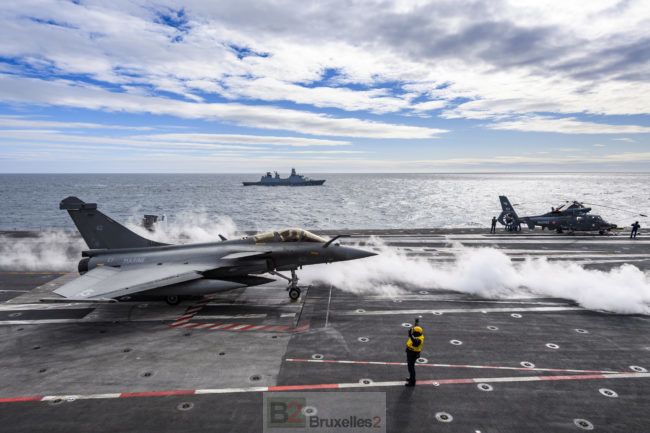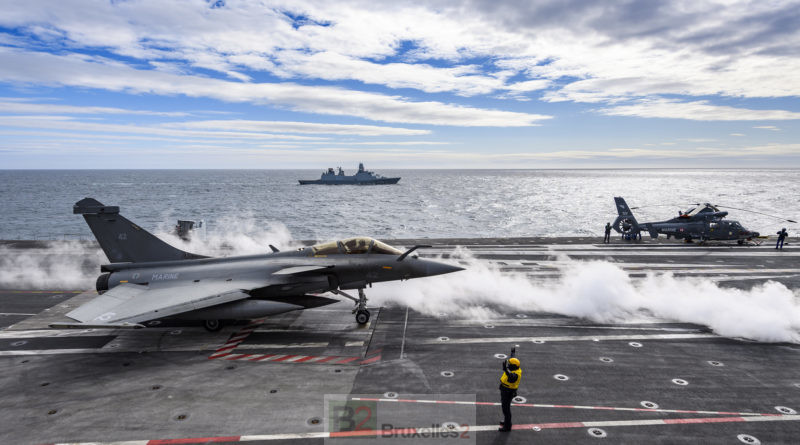Return to port for the Charles-de-Gaulle aircraft carrier, contaminated by the pandemic (v3)
(B2) The French carrier battle group shortens its operation. Around XNUMX sailors are showing the (characteristic) symptoms of the coronavirus. What to shower the official message of operational posture 'unchanged'

(Update 10.4 - 13 p.m.) From 40 suspects, we went to 50 confirmed cases, the prognosis fell on Friday, read: 50 cases detected positive for coronavirus on the 'Charles'
40 suspected cases!
« About forty sailors are now under reinforced medical observation, announces the General Staff of the Armed Forces (EMA) in a communicated, released April 8. They present symptoms compatible with a possible infection with Covid-19. These first symptoms appeared recently. (1) A screening team was deployed on board the Charles-de-Gaulle (R-91) for " investigate cases that have arisen "and try" to hinder the spread of the virus on board the ship ».
Return to Toulon
The decision was taken to anticipate the return of the 'Foch' mission, initially scheduled for April 23 (read: A carrier group around the Charles-de-Gaulle deploys, with Europeans, episodic). Currently off Portugal, the only aircraft carrier of the French navy and its escort should arrive at the port of Toulon within a week, according to the national navy.
A first sailor evacuated ten days ago
A first non-commissioned officer had been evacuated during a stopover in Denmark on March 29 and 30, because he presented suspicious symptoms. However, the tests were negative. Copenhagen had notably provided logistical support to the Foch mission, one of its frigates participating for the second consecutive year in maneuvers with the carrier battle group.
A potential source of infection
The aircraft carrier, like any ship, is particularly conducive to the circulation of such an epidemic. The crew lives by nature in total confinement. The commander has certainly decided to reduce meetings and gatherings as much as possible. Equipment and common areas should be cleaned twice a day. The aircraft carrier has all the medical equipment to manage cases which, if necessary, would worsen: a hospitalization room with a dozen beds with respirators and isolation space, as well as helicopters to evacuate patients.
A stopover in Brest because of everything?
According to Telegram from Brest, it was during a stopover in Brest between March 13 and 16 that the coronavirus infection could have taken place and the virus interfered on board. The sailors were indeed authorized to join their relatives, with strict instructions to remain confined to the family. " Brest has indeed become the stopover for all dangers and the outing with families, the weak link in this rigorous chain of precautions writes our Breton colleague.
A case on board the Belgians
The Belgian frigate Leopold I which accompanied theCharles' during her journey from Gibraltar to the North Sea also stopped at Brest at the same time. A sailor who suffered from characteristic symptoms was disembarked shortly afterwards. The test carried out proved positive on March 24, that is ten days after the stopover (2). The Belgian navy then took the decision to bring in the frigate Léopold I in advance (read: A case of coronavirus on board. The Leopold I returns).
Two major exercises torpedoed
The coronavirus epidemic had forced the carrier group to reduce the intensity of the two planned exercises: Frisian Flag 2020 et Joint Warrior 201/Griffin Strike. The pandemic has forced to cancel or reduce the spectrum of the two exercises and to restrict the entry of force into the ports confirms the Portuguese general staff, in a communicated published on April 9. As for the Portuguese frigate Corte Real who was taking part in the task force, she returned to the port of Lisbon on Wednesday (April 8).
Commentary: a coronavirus that reaches the sinews of war
This stoppage of the Charles comes after the suspension of operations in Iraq (read: France suspends, in turn, its operations in Iraq) and the suspension of several European missions and operations (read: CSDP military missions continue, but at low speed).
Operational capacity questioned
A few days ago, the French authorities showed their confidence. On April 3, the French general staff declared to B2 that " the epidemic has no significant impact on the maritime operational posture “, apart from a few calls canceled due to lack of access to ports. The next day, April 4, the Minister of the Armies Florence Parly straddled the same posture, justifying in an interview that if 600 cases had been identified throughout the French army, this did not cause any problem: “ Our operational posture is not impacted she proudly affirmed to the Latest News from Alsace and daily newspapers of the Ebra group (3).
Communication rather than information
It actually seems that behind the bravery displayed, the reality is slightly different (read: From the Sahel to the regiments, the French army takes blows in the face of the coronavirus). That's a shame. Everyone knows that in times of crisis, the opacity of silent communication only has a time, nothing beats information, and that whoever says things frankly wins in the long term (cf. Angela Merkel ). The word of Florence Parly is not worthy of a responsible minister. It now risks being discredited, both internally and externally. At the Ministry of the Armed Forces, we are also very bored to communicate on these subjects, in the face of journalists who are numerous to demand answers: “ We don't know more. We receive the elements of the official voice. »
(RM and NGV)
The coronavirus sows discord in the US navy
Last week, it was the American aircraft carrier USS Theodore Roosevelt (CVN-71) which was confronted with such an epidemic. Its commander, the captain (captain) Brett Crozier, had to push the hierarchy to its limits by sending a call for help which leaked in the press, to force the evacuation of the 4800 sailors from his boat in Guam. the San Francisco Chronicle being the first to reveal the affair. Sacked in stride, the officer left the edge under the cheers of his crew. The outcry was such across the Atlantic that the Minister Delegate for the Navy (secretary) Thomas Modly, actor of this layoff, had to submit his resignation, accepted by the Minister of Defense, Tuesday, April 7 (4). The current undersecretary in charge of the army (land), Jim McPherson who replaces him in the navy, announced Mark Esper, the US Secretary of Defense.
- The symptoms of Covid-19, if they can be similar to those of the flu, differ significantly, by their combination (cough, sore throat, headache, sudden fatigue, fever, difficulty breathing, etc.), their progressive place (unlike a flu), their variation in amplitude over the days, and by the very rapid rate of contamination of relatives.
- Delay which corresponds to the incubation time between a few days and 14 days.
- Given the background and the incubation times, it seems difficult to believe that at that time the Minister was not aware of the situation on board the Charles-de-Gaulle, which was beginning to become complicated.
- Download the resignation by Thomas Modly
(Updated) details provided on the stopover in Brest, the antecedent of the Belgian Leopold I case, and information from the Portuguese Navy on the reduction in the scale of the exercises.



